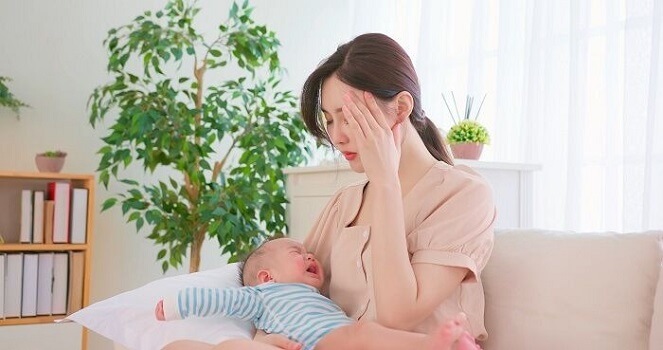Creating a routine helps ensure your baby is getting enough sleep.
Start by establishing regular sleep and wake times.
This will help your baby's body understand when it's time to rest, promoting better quality sleep.
Also, try to make the same activities part of your bedtime routine.
This could include reading stories, singing lullabies, or listening to soothing music.
It's also important to keep distractions at bay, such as turning off TVs and devices like tablets or phones during this pre-bedtime relaxation period.
Make sure you stick to the routine as much as possible; consistency is key to helping your baby adjust and get into a good sleep pattern faster.
Adjust the Environment for the baby's sleep
Once the room is set up, it's important to adjust the environment to create an ideal sleeping environment for your baby.
To ensure your child feels comfortable and secure in their sleep space, here are some tips:
Make sure the temperatures are correct.
A baby's body temperature can fluctuate easily, so it's important that you maintain a moderate temperature in the room.
Keep it cool enough that your baby doesn't overheat, but warm enough that he doesn't get cold either.
Also be aware of any drafts from windows or doors that could also affect the temperature of the room.
Adjusting light levels can also play an important role in creating an ideal sleep environment for your child.
Try to dim the lights as much as possible and put curtains on the windows to keep the rooms dark during naps and bedtime – this helps babies naturally associate darkness with bedtime rather than daytime activities like playing and sleeping. to explore.
The soft night lights are also useful if you need to check on your baby without having to turn on any bright lights while your baby is sleeping.
Help the baby calm down
After placing your baby in his sleep space, help him settle down.
This could include playing white noise or soft music, using a night light, or rocking the baby until he calms down.
If your baby is crying, try gently patting her back or bottom until she relaxes.
You can also swaddle your baby to create a sense of security and warmth that can help your baby feel calmer and more secure.
Singing softly can also be helpful in calming a fussy baby; this could be anything from lullabies to lullabies.
Be sure to keep the environment as dark and quiet as possible, while letting your baby know you are nearby.
Monitor eating habits
Monitoring eating habits is an important step in improving your baby's sleep.
It all starts with knowing how much your baby should be eating.
Your baby should have a feeding schedule, including the amount and type of food he is consuming.
For example, if your baby is formula fed, you should monitor his intake and ensure he is eating enough based on age recommendations.
If your baby is breastfed, tracking the number of times he feeds during the day can help you understand if he is getting enough nutrition.
Plus, it can help you determine when it's time to start introducing solid foods into their diet so they get all the nutrients they need for proper growth and development, as well as helping them sleep better at night.
Monitoring the types of foods your baby is eating can also be beneficial, as different types of foods can affect babies' energy levels and sleep at night.
You'll want to keep track of this information so you can adjust their diet accordingly if necessary.
Use white noise
White noise is a powerful tool to help babies sleep.
It creates a consistent soundscape, blocking out distracting noises that might wake your baby.
One of the most popular types of white noise is a fan or humidifier that makes low noises that can help your baby fall asleep and stay asleep.
You can also use an app on your phone or tablet to play white noise recordings like ocean sounds, rainforest noises or animal sounds.
It's important to keep the volume at a moderate level so it doesn't get too loud and disturb your baby's sleep even more.
Plus, you can experiment with different volumes and sounds until you find the perfect fit for your baby's room environment.
Having a consistent source of white noise will create a familiar sleep environment for your little one, making it easier for them to sink into dreamland!
Conclusion: healthy sleep for babies
Creating good sleep habits early on can benefit parents and children alike.
Adequate sleep helps babies develop physically and mentally, as well as boosting the immune system – all essential for growth and development during infancy.
Parents also need adequate rest to effectively care for their children!
As such, it's important to prioritize healthy sleep habits from a young age in order to ensure everyone gets enough sleep.

